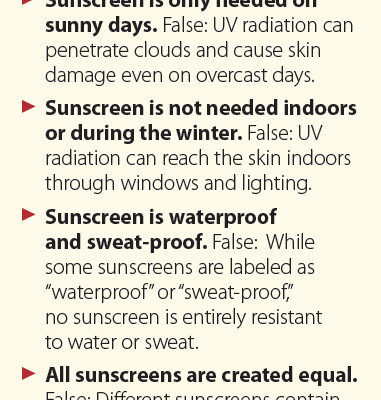Seek Shade and Use Sunscreen Daily to Shield Yourself from Harmful Rays
Protecting your skin from the sun reduces your risk of skin cancer, helps prevent new age spots, and keeps your skin hydrated. It’s important for women to protect their skin from the sun year-round, but in many regions, the intensity of ultraviolet (UV) rays tends to be higher during the sunny summer months, so skin protection during this time of year is particularly crucial.
Some other reasons sun protection may be even more of a priority during summer is that in many locations daylight hours are longer in the summer months; many of us engage in outdoor activities such as swimming, hiking, and picnicking; and women tend to wear lighter, more revealing clothing during the warmer months, exposing more skin to the sun. Regardless of the season, it’s essential to make sun protection part of your daily routine, including applying sunscreen, seeking shade, wearing protective clothing and sunglasses, and avoiding outdoor activities during peak sun hours when possible.
Minimize Skin Cancer Risk
Skin cancer is more prevalent in older adults due to cumulative sun exposure over their lifetime. About 90 percent of nonmelanoma skin cancers, which includes basal cell carcinoma (BCC) and squamous cell carcinoma (SCC), are associated with exposure to UV radiation from the sun, according to the Skin Cancer Foundation. UV exposure is also a major risk factor for the development of melanoma, which is less common than nonmelanoma skin cancers, but is more aggressive and has a higher risk of spreading to other parts of the body, according to the American Cancer Society.

Protecting your skin from the sun’s harmful rays can reduce the risk of developing skin cancer.
Studies show that regular sunscreen use can reduce the risk of BCC, the most common type of skin cancer, by up to 50 percent. “Both UVA and UVB rays contribute to skin cancer risk, so it is important to use a sunscreen that protects against both types of rays. Buying a product labelled “broad-spectrum” will ensure that you are protected against both types of rays,” says Shari Lipner, MD, PhD, associate professor of clinical dermatology at Weill Cornell Medicine. The American Academy of Dermatology (AAD) recommends using a broad-spectrum sunscreen with an SPF (sun protection factor) of 30 or higher.
Regardless of ethnicity or race, no one is immune from the sun’s damaging effects. While people with darker skin have more natural protection against UV radiation compared with those with lighter skin, they are still susceptible to sunburn, skin damage, and skin cancer. “To drive home the importance of using sunscreen to all of my patients, I tell them a story about one of my patients (without revealing the patient’s identity) who developed skin cancer and then had to face all of the consequences, including surgery, that went along with that,” says Dr. Lipner.
Protect Your Skin All Year
UVA and UVB rays are present all year long, in all climates and regions, even on cloudy or overcast days. These rays can penetrate clouds and reflect off surfaces such as snow, water, sand, and pavement, increasing the risk of sunburn, skin damage, and skin cancer. Sunscreen should be a part of everyone’s daily self-care routine. For women who use facial foundation, CeraVe’s Hydrating Mineral Sunscreen is a good combination product: It offers full-spectrum coverage, with an SPF of 30.
Here are some tips to follow for effective sunscreen use:
- All exposed skin should be covered with a layer of sunscreen. A shot glass, or one ounce, is generally enough to cover all the skin.
- Sunscreen should be reapplied every two hours and more often after sweating or swimming.
- Check the expiration date. If the sunscreen is expired, or there’s no expiration date but it’s more than three years old, throw it out and get a new product.
Prevent Premature Aging
In addition to skin cancer prevention, there are other reasons to protect your
skin from the sun. For example, prolonged sun exposure can lead to premature aging of the skin, including wrinkles, fine lines, age spots, and sagging skin. Sun exposure can also exacerbate conditions, such as eczema and psoriasis, and can cause uneven pigmentation leading to sunspots, freckles, and hyperpigmentation that can appear as brown, black, gray, or pink patches.
Schedule an Annual Skin Exam
Regular skin examinations by a health-care professional are important for early detection of skin cancer. By including broad-spectrum sunscreen in your daily skin-care routine and wearing protective clothing, hats, and sunglasses, you can protect yourself from the sun’s harmful rays and reduce the risk of sunburn, skin damage, and skin cancer.
The post Seek Shade and Use Sunscreen Daily to Shield Yourself from Harmful Rays appeared first on University Health News.
Read Original Article: Seek Shade and Use Sunscreen Daily to Shield Yourself from Harmful Rays »


